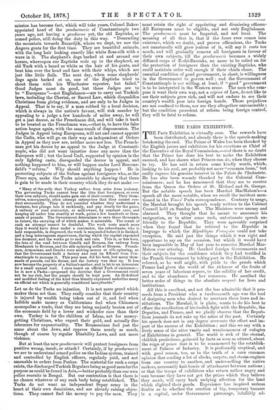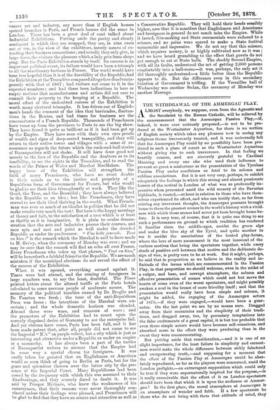THE PARIS EXHIBITION. T HE Paris Exhibition is virtually over. The
rewards have been distributed, and already there is the speech-making betokening the end. The Prince of Wales has been thanked by the English jurors and exhibitors for his exertions as Chief of the Executive of the Royal Commission,—and there is no doubt that the Prince has done his best to make the Exhibition succeed, and has shown what Princes can do, when they choose to try. He has said in return some kindly words, which, looking to his zeal, are probably not mere "common form," but really express his genuine interest in the Palais de rIndustrie. He has also been warmly thanked by the Colonial Com- missioners; and he has announced that they are to receive from the Queen the Orders of St. Michael and St. George.
But the notable speech has been Marshal MacMahon's—a speech all the more notable, when we recall the incident men- tioned in the Times' Paris correspondence. Contrary to usage, the Marshal brought his speech ready written to the Cabinet Council held on Sunday last. The Ministers were uneasy and alarmed. They thought that he meant to announce his resignation, or to utter some rash, unfortunate speech un- friendly to the Republic. They were agreeably surprised when they found that he referred to the Republic in language to which the Republique Francuise could not take exception. He said just the things which it was right and opportune to say on the occasion, but which it would have been impossible in May of last year to conceive Marshal Mac- Mahon ever uttering. He thanked foreign Governments and their subjects for the confidence which they had testified in the French Government by taking part in the Exhibition. He referred, as he well might, with pride to the proofs which France had given the world of the richness of the fruits of seven years of laborious repose, to the solidity of her credit, and to the abundance of her resources. He ascribed the better order of things to the absolute respect for laws and institutions.
All this is excellent, and not the less admirable that it pro- ceeds from a President who a twelvemonth ago was the tool of designing men who desired to overturn these laws and in- stitutions. The Marshal, it is plain, wants to do his best to efface the recollection of his foolish fight with the Republic, the Deputies, and France, and we gladly observe that the Repub- lican journals do not rake up the ashes of the past. Certainly his speech does not in any degree over-rate the effect and im- port of the success of the Exhibition ; and this we say with a lively sense of the utter vanity and wearisomeness of eulogies of Exhibitions in general. The world is sick of the eternal, childish predictions, gainsaid by facts as soon as uttered, about the reign of peace that is to be commenced by the establish- ment of Palaces of Industry. It is profoundly sceptical, and with good reason, too, as to the truth of a once common opinion that sending a lot of clocks, carpets, and steam-engines from one country to another, and under-selling the native makers, necessarily knit bonds of attachment between nations ; or that the troops of exhibitors who return rather angry and sore because they have not got the prizes which they believe they merit, will carry back undying affection for the land which slighted their goods. Experience has inspired serious doubts as to whether the erection of big, temporary bazaars in a capital, under Government patronage, infallibly ad- vances art and industry, any more than if English houses opened branches in Paris, and French houses did the same in London. There has been a great deal of cant talked about Industrial Exhibitions. Putting aside the poetry and cloudy sentiment in which they are wrapped, they are, in nine cases out of ten. in the view of the exhibitors, merely means of ex- tending their business connections; and usually they only give, in large doses, the visitors the pleasure which a lady gets from shop- ping. But the Paris Exhibition stands by itself. Its success is an important political event, its failure would have been a triumph to all the reactionary factions in France. The world would have been less hopeful than it is of the durability of the Republic, had the Exhibition at the Trocadero compared altogether disadvanta- geously with that of 1867 ; had visitors not come to it in the expected numbers ; and had there been indications in bare or empty sections that manufacturers and artists did not care to commit their property to the keeping of a Republic. The moral effect of the undoubted success of the Exhibition is worth many electoral triumphs. It has driven out of English- men's heads the remnant of the idea that barricades, fluctua- tions in the Rentes, and bad times for business are the concomitants of a French Republic. Thousands of Frenchmen have come up from the provinces to Paris to see the big show. They have found it quite as brilliant as if it had been got up by the Empire. They have seen with their own eyes proofs of wealth and signs of deep-seated tranquillity, and they will return to their native towns and villages with a sense of re- assurance as regards the future which the cock-and-bull stories of Buonapartists will not shake. It will have done good not merely to the foes of the Republic and the doubters as to its feasibility, to see the sights in the Trocadero, and to read the words of the Prince of Wales and Marshal MacMahon. The happy issue of the Exhibition will strengthen the faith of many Frenchmen, who have no overt doubts in their minds as to the justice and propriety of a Republican form of Government for France, but who would be glad to see their idea triumphantly at work. They like the Good, the True, and the Beautiful ; they have always believed in the Republic as an idea ; but like Frenchmen, they have craved to see their ideal thriving in the world. What French- man was ever so much of an idealist in politics that he did not make results very much the test? But here is the happy marriage of theory and fact, to the satisfaction of a race which is at least as thrifty as it is imaginative. It is plain to ocular demon- stration that the arts and industries pursue their courses, and men spin and cast and paint as well under the dreaded Republic as under its predecessor. " Une belle journee. Tout va bien !" is the remark which the Marshal is said to have made to M. Chevy, when the ceremony of Monday was over ; and we may be sure that the remark will find an echo all over France. Every Frenchman who takes up that phrase, " Tout va bien," will he henceforth a faithful friend to the Republic. We are much mistaken if the municipal elections do not reveal the effect of the success of the Exhibition.
When it was opened, everything seemed against it. Times were bad abroad, and the coming of foreigners in large numbers was, to say the least, doubtful. The Times printed letters about the altered tariffs at the Paris hotels calculated to scare nervous people of moderate means. The memory of the political troubles caused by De Broglie and De Fourtou was fresh ; the tone of the anti-Republican Press was fierce ; the intentions of the Marshal were un- certain ; and the whole domestic horizon was clouded. Abroad there were wars, and rumours of wars ; and the promoters of the, Exhibition had to count upon the scarcely disguised desire of Germany to see the enterprise fail. And yet visitors have come, Paris has been full, and it has been made patent that, after all, people did not come to see the Imperial " N.'s " on purple velvet, but a city which is just as interesting and attractive under a Republic as under an empire or a monarchy. It has always been a part of the tactics of Buonapartist writers to assume that the Empire had in sonic way a special charm for foreigners. It was coolly taken for granted that an Englishman or American would as soon think of going to Berlin as Paris, but for the grace and splendour thrown over the latter city by the pre- sence of the Imperial Court. Many Republicans had been cowed by the frequency with which this was assumed to their disadvantage, and they scarcely dared to doubt it. It was said by Prosper Merimee, who knew the weaknesses of his countrymen, that their reasons were never thoroughly con- vinced unless their feelings were pleased, and Frenchmen will he glad to find that they have an ornate and attractive as well as a Conservative Republic. They will hold their heads .sensibly higher, now that it is manifest that Englishmen and Americans and foreigners in general do not much miss the Empire. While it lasted, fête-making and State ceremonials were reduced to a science, and no pains were spared to make a State festival memorable and impressive. We do not say that this science, which requires money, is so highly cultivated now as it was ; and we have heard grumbling to the effect that guests do not get enough to eat at State balls. The shoddy Second Empire, with all its faults, understood the art of getting 2,000 persons comfortably into a ball-room—it was, perhaps, the only art it did thoroughly understand—a little better than the Republic appears to do. But the difference even in this secondary function of Government is trifling. If the Versailles ball of Wednesday was another Sedan, the ceremony of Monday was another Marengo.



































 Previous page
Previous page